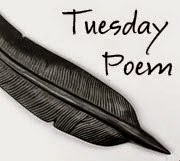Stir the
compost and feel the hot air pushing up like the breath of god
somewhere
under the rot there's a whisper saying
Getta bitta
land, getta bitta land
somewhere
for your kids to run wild and safe,
somewhere
to grow your beans and basil and dreams
to live
slower than we ever dared
to live as
if the ending was good
planting
blue lupins for next season
call it
nitrogen fixing or call it an act of faith.
In the
meantime I love dirt the way I love god
ignoring
it, mostly
not needing
it, because my veggies come from the shop
it's so
easy to live with clean hands
until the
day we lose someone and realise the dirt is all we have to entrust them to
because we
cannot hold each other forever
when we
can't breathe air anymore we breathe dirt,
it will
fill our mouths and ears
like song
it will
embrace us so thoroughly
that little
by little, we'll turn into God
Phoebe Wright works as a tutor at the University of Canterbury and divides the rest of her time between writing, community stuff and sometimes dancing to really bad pop songs, to stay sane. She recently started a blog, http://teapotofsolidarity.wordpress.com/
Her blog is called the Teapot of Solidarity and it explores how and why different people try to save the world. Phoebe will edit your essay in exchange for wine or a good story.
I encountered Phoebe and her work at a recent Catalyst Road Show entitled "Uncle Slam" when she was one of the Kiwi poets reading in support of the two American guest poets, Ken Arkind and Carrie Rudzinski. The autumn and winter months have proved fortuitous for me when it comes to discovering the work of more local poets. I guess they come indoors more as the weather becomes more inclement.
If you'll excuse the pun, I enjoy the earthiness of Phoebe's poetry, its concrete images that seem to anchor its philosophical exploration. Phoebe's poetry investigates the ambiguities and incongruities of human existence, but nevertheless arrives at life-affirming conclusions. I also like how Phoebe toys with spirituality, coming down on the side of mystery and imagination, but holding unquestioning certainty at arm's length. Phoebe's poems ask more questions than they answer, but their fluidity gives them power and, after all, isn't doubt and unknowing a constant facet of human experience.
After you've enjoyed Phoebe's poem, check out all my wonderful fellow Tuesday Poets and see what they have to offer to uplift, educate, titillate, amuse and bedazzle you.

